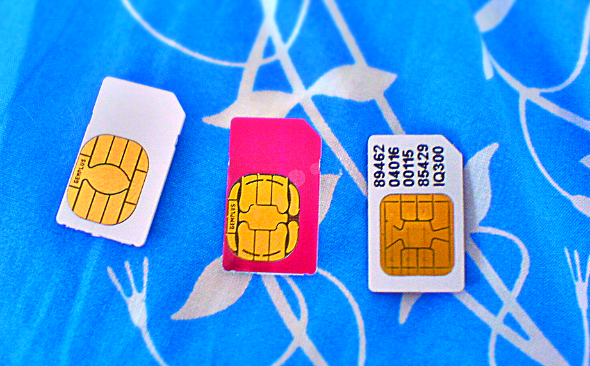What’s Going On?
Should you be able to make a phone call without the government knowing it was you?
In the name of crime-fighting and national security, millions of people have lost the right to anonymous phone numbers. In around 80 countries you need to show your ID before you can legally buy a new SIM card for your phone. Around half of these countries are in Africa, where governments have been especially keen to know who is connected to which phone.
There is little evidence that criminals are actually deterred by these measures. SIM cards are often cloned or registered in bulk, resold and shared. Meanwhile, we know for certain that mandatory registration makes digital surveillance and harassment under repressive regimes easier. There are also serious risks for data mismanagement and vulnerability to hackers and spammers.
In Zambia, phone companies were said to be handing over registration data daily to the secret service. Two years ago, during an election, thousands of Zambians with registered numbers were bombarded with SMS messages from the ruling party seeking their vote.
In China’s Xinjiang region, people with unregistered phones using VPN services (used to circumvent Internet censorship) or foreign messaging apps had their connections cut and were told to report to police with their IDs to restore service, ostensibly to fight terror.
Mandatory registration can also deny access to communications to the poor. Obtaining an official ID usually requires a basic level of literacy and the means to travel. Among the millions of people who can’t get connected or have seen their phones disconnected for failing to register (in multiple countries) are the poorest citizens who often lack identification papers.
Meanwhile, anyone caught handling unregistered SIMs is at risk of fines or worse in many countries. Immigrants face difficulties too. In Russia, an official anti-extremism task force suggested that the communications police should conduct impromptu inspections of SIM vendors and that phones belonging to foreigners should be automatically cut off as soon as visas expire.
Who’s Doing Something?
There has been relatively little public resistance to mandatory SIM registration in any region. In Guatemala, a group of civil society organisations even campaigned in favor of registration for two years, believing it would deter theft and anonymous extortion calls.
Opposing SIM registration, the Uganda Human Rights Network and Legal Brains Trust took the Uganda Communications Commission to court in 2013 but eventually lost.
Among the telecom companies that have not complied easily, MTN in Nigeria is facing a $5.2 billion fine for failing to disconnect 5.2 million SIMs before a government deadline.
It is the fight waged by data privacy campaigners everywhere that is the frontline for being able to hold companies and governments accountable whenever irregularities do happen. Governments have previously hacked SIM card manufacturers to gain direct access to billions of phones, so we know they want the data. Should they have it without reservations?
What Should I Do?
- Inform yourself about what levels of privacy and oversight exist for mobile phones in your country. Search for local or regional groups supporting data privacy.
- Spread the word about the risks for surveillance and for the commodification of personal information. Are there rules for how data obtained through registration may be used?
- Research and write about surveillance as part of the mobile phone “success” story of Africa. Consider that people have been arrested for text messages.
- If compulsory SIM registration is proposed in your country, join the public debate and do your part to ensure informed decisions are reached.



Country authorities from the democratic republic of Congo invited communication network to register SIM cards and the latter done it as i was asked to do. But the country is so huge and government doesn’t have total control of the country. In rural areas for example, most of shops registering telephone users don’t proceed to registraction of SIMs simply because as you mentioned in your article, most of people living in rural areas are illiterates. some people even don’t their own names. In some areas, two or three persons share one SIM card and shops holders are getting trouble to proceed to registration.
Personally, i can say that SIM registration can be good if this is used for making security of the country and the track of as ours is one of the most dangerous areas in the world. But if government use those IDs for politic issues, i think this is unacceptabe. Privacy is very important for everyone, and i think that as government hide its privacies, the people’s privacies also could be respected.
[…] a molta de la gent més pobre del món (el 80% d’Àfrica encara no té accés a Internet), però molts governs han introduït mesures per a obligar al registre de la targeta SIM, cosa que complica les comunicacions privades. Mentrestant, costa d’imaginar que la propera gran […]
[…] the world’s poorest people (80% of Africa is still offline) but many governments have also been quick to introduce mandatory SIM card registration making private communication tricky. Meanwhile, it’s hard to imagine that the next big software […]
As a resident in a western democracy, I feel predated on by scammers and fraudsters who operate in plain sight. It is apparently possible for boiler room operations to set up numbers that don’t appear to attach to a contactable organisation or individuals. Where the telecoms operators and the regulator appear to be protective of scammers and frauds, no doubt citing some higher moral grounds… freedom, privacy…. but definitely not profits, or not giving a f**k… of course.
If I had a vote on the topic, as if…. I would vote for openness transparency and disclosure. If I had ever been harassed by MI5, I might feel different, but I haven’t so I don’t.
I realise I’m probably the contrary voice in the echo chamber of self reinforcing opinions, so donning my bile suit.